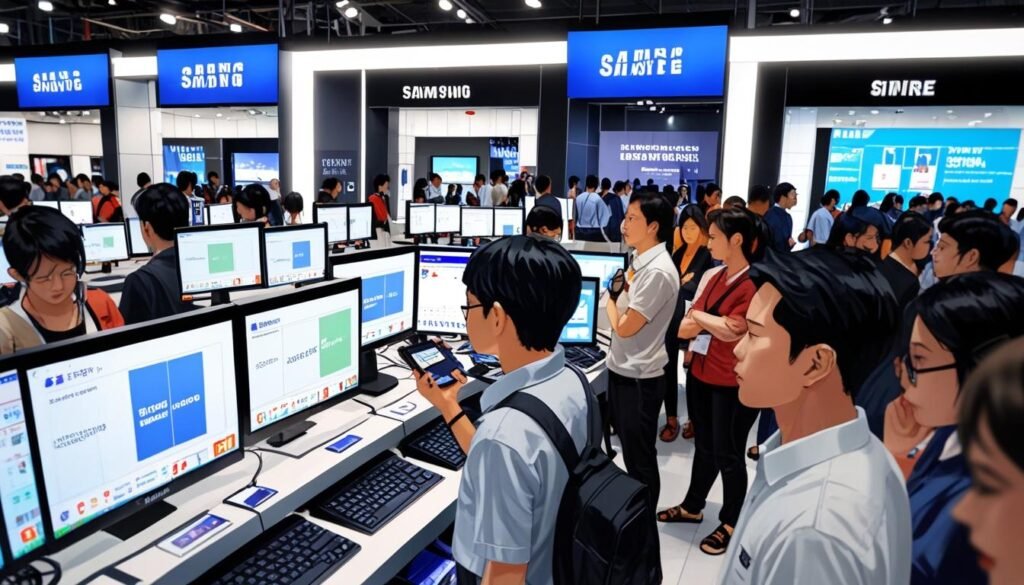**Seoul**: Samsung Electronics forecasts a 20 per cent rise in operating profit for Q1 2024 amid growing chip demand driven by upcoming US tariffs. The company experiences robust sales of its Galaxy S25 and remains optimistic about a recovering chip market despite challenges in semiconductor pricing.
Samsung Electronics has reported a notable increase in its quarterly profits, significantly influenced by customer behaviour amidst impending US tariffs and export controls. The South Korean tech giant predicts an operating profit of Won6.6 trillion (approximately $4.5 billion) for the first quarter of 2024, exceeding earlier estimates of Won5.2 trillion from LSEG SmartEstimate. Sales are projected to rise by roughly 10 per cent compared to the same period last year. This forecast propelled a 2.1 per cent spike in the company’s shares on Tuesday morning, although this increase was outpaced by rival SK Hynix, whose shares surged nearly 4 per cent as the South Korean market experienced a slight recovery following widespread losses across Asia the previous day.
Despite several semiconductors being exempt from the recent US tariffs announced by President Donald Trump, he indicated that tariffs on chip imports would commence “very soon.” In recent months, anticipation surrounding these tariffs has spurred demand for various tech products requiring advanced and legacy chips. This heightened demand has been a significant factor in Samsung’s sales performance.
The United States is expected to impose stricter export controls and additional restrictions on foreign chipmakers intending to sell to China or collaborate with Chinese companies. These actions have been prompted by significant advancements achieved by the Chinese artificial intelligence startup DeepSeek earlier this year. Consequently, there has been a surge of interest from Chinese tech groups to stockpile memory and AI chips, particularly Samsung’s high-bandwidth memory (HBM) components, essential for AI applications such as Nvidia’s H20 chip.
Moreover, Samsung’s dedicated contract chipmaking division also produces AI chips for Chinese clients, including Baidu, a prominent search engine provider. Recent reports indicate that Samsung sold several years’ worth of logic dies to Baidu’s semiconductor design subsidiary last year, underscoring the company’s pivotal role in the AI chip supply chain.
Despite a stronger-than-anticipated outlook for the first quarter, analysts caution that Samsung’s semiconductor division is still contending with declining prices, delays in AI chip shipments, and growing losses within its contract manufacturing segment. The company’s ongoing strategy includes redesigning its advanced HBM products to comply with Nvidia’s stringent qualification standards for its primary AI chips.
Jeff Kim, the head of research at KB Securities, expressed optimism regarding the future performance of Samsung, suggesting that the company would likely benefit from a recovering chip market in upcoming quarters. “Their earnings will improve this year after hitting the bottom in the first quarter, with chip demand outpacing supply,” Kim stated.
Adding further complexity to the situation, Goldman Sachs analysts predict that prices for conventional chips may reach a significant turning point in the third quarter after experiencing a lesser decline in the second quarter.
On the smartphone front, Samsung’s division experienced robust sales of its flagship Galaxy S25 model in the first quarter, partly driven by pre-sales from North American customers aiming to circumvent potential price hikes due to the impending US tariffs. Trump’s announcement of a 25 per cent tariff on imports from South Korea is expected to impact the pricing of various Samsung products, including smartphones and other consumer electronics. Additionally, a 46 per cent tariff on imports from Vietnam, where a substantial portion of Samsung’s smartphones are produced, raises further implications for the company’s pricing strategy. With many of Samsung’s televisions manufactured in Mexico, which faces a 20 per cent US tariff, the company’s operational landscape appears increasingly complex.
Analysts have noted that the rush among consumers to secure chips and smartphones early in the year could lead to stagnating sales for Samsung in the following quarter, amplifying scrutiny of the company’s performance in an evolving economic climate.
Source: Noah Wire Services




